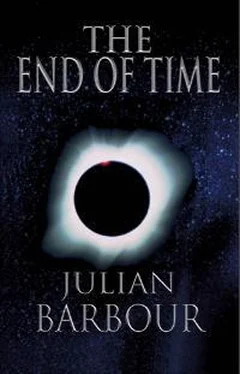He argues that a play can achieve the same effect, and so help us to escape the ravages of time. ‘Whether or not we admit it to ourselves, we are all haunted by a truly awful sense of impermanence.’ Again, this is very beautiful writing, but has Williams failed to see the truth all around us – the Platonic eternity we inhabit in each instant? Is it blindness that drives him to seek eternity? Some people can pass a cathedral without noticing it.
The desire for an afterlife is very understandable, but we may be looking for immortality in the wrong place. I mentioned Schrödinger’s curious failure to recognize in his own physics the philosophy of ancient India (especially the Upanishads) he so admired. There is a beautiful passage at the end of his epilogue to What is Life ? that nevertheless strikes me as wishful thinking. He poses the question, ‘What is this “ I ”?’ Here is part of his answer:
If you analyse it closely you will, I think, find that it is just a little bit more than a collection of single data (experiences and memories), namely the canvas upon which they are collected. And you will, on close introspection, find that what you really mean by ‘I’ is that ground-stuff upon which they are collected. You may come to a distant country, lose sight of all your friends, may all but forget them; you acquire new friends, you share life with them as intensely as you ever did with your old ones … Yet there has been no intermediate break, no death.
Thus, he argues that our personal ‘ground-stuff is imperishable, holding us together through all the changes of life. He ends with this affirmation of faith: ‘In no case is there a loss of personal existence to deplore. Nor will there ever be.’ But earlier he had praised the great Upanishads for their recognition that ATHMAN = BRAHMAN (the personal self equals the omnipresent, all-comprehending eternal self). He seems to want to have his cake and eat it, to be dissolved in the all-comprehending eternal self yet still retain a personal identity. He is not finding a canvas, he is clutching for a straw.
Tennessee Williams faced up to things more squarely: ‘About their lives people ought to remember that when they are finished, everything in them will be contained in a marvelous state of repose which is the same as that which they unconsciously admired in drama.’ Exactly: this is the truth and beauty of Keat’s Grecian urn. Williams goes on: ‘Snatching the eternal out of the desperately fleeting is the great magic trick of human existence.’ Yes, though it’s not a magic trick but simply the opening of our eyes.
Some years ago, I heard Dame Janet Baker interviewed on radio. She was asked if she ever listened to her recordings and, if so, what were her favourites. She said she almost never listened to them. For her, every Now was so exciting and new, it was a great mistake to try to repeat one. In her singing she made no attempt at all to recreate earlier performances and do the high points the same way as the night before. Again and again she spoke with the deepest reverence of the Now and how it should be new and happen spontaneously. ‘The Now is what is real’, she said.
I thought it was the perfect artistic expression of how I see timeless quantum cosmology. By definition, every Now in Platonia is new, for all the Nows are different. But some are vastly more interesting and exciting than others. Miraculously, these are the Nows that the wave function of the universe seems to find with unerring skill.
What a gift too is the specious present. Appreciation of poetry and music would be impossible without it. I can live without motion if I can sense it as the line that runs through a story all bound up in one Now. Janet Baker is right. Watching motion, listening to Beethoven, looking at a painting by Turner – all are given to us in the Now, which we experience as the specious present. Einstein seems to have regretted that modern science – and his own relativity in particular – had taken the Now, the vibrant present, out of the world. On the contrary, I think the Now may well constitute the very essence of the physical world, the first quantum concept (as David Deutsch refers to time). The artists always knew it was there, and worshipped at its altar. It was Dirac’s rediscovery of the Now at the heart of general relativity that started my quest.
I do also feel that novelty is a genuine element of quantum mechanics, especially in the many-worlds form, not present in classical mechanics. In the main text I spoke of lying down to sleep and knowing ‘not what we should wake to’. I see no fundamental line of time and causal evolution along which we march as robots; each experienced Now is new and distinct. I think that the many-worlds hypothesis is the scientific counterpart of the thrill of artistic creation that Janet Baker feels so strongly. It is something essentially new for which there is no adequate explanation in any supposed past from which we have tumbled via a computer algorithm. There is no explanation of any one triangle in terms of any others, and the same is true of all Nows.
The Italian painter Claudio Olivieri, a friend of Bruno Bertotti, creates paintings in which he evokes a sense of timelessness. He expresses his aim through this poem:
È con la pittura che le apparenze si mutano in apparizioni:
Ciò che è mostrato non è la verosimiglianza ma la nascita.
È così che ci viene restituto il nostro presente,
L’assolutamente unico ma imprevedibile presente,
Somma di tutti tempi, raduno degli attimi che ci fanno
Viventi, atto sempre inaugurale dell’esistere.
A free translation is as follows:
The painting transfigures semblance in sudden apparition,
showing not likeness but birth.
That is how we are given back our present,
The absolutely unique but unforeseeable present,
sum of all times, gathering of the moments that make us alive,
the ever inaugural act of existence.
This does express the main ideas I have tried to get across in the final part of the book. Each experienced instant is a separate creation (birth), the ever inaugural act of existence, brought to life by the gathering of all times. The thrill that Janet Baker experiences in each Now is the assolutamente unico ma imprevedibile presente , that finding of ourselves in one of the instants that quantum mechanics makes resonate especially strongly with other instants.
As I began, so I end. Turner has taught us the way to look at the world, and even how to come to terms with many worlds. Once any painting of his had reached a certain stage of completion, all additions to it became simply variations on an existing masterpiece. All the stages through which his paintings then passed were perfect, and each was – is – a separate world. Nature is an even more consummate artist than Turner. For he too is part of Nature. Turner is also right in the way he places us humans in the great arena. In nearly all his pictures, human beings, though tiny on the cosmic scale, are integral parts of some huge picture, Keats’s urn painted large. We are simultaneously spectators and participants, subtly changing and constantly working on an inherited landscape. We are there in one place but bound up into something much larger. Gretchen Kubasiak gave me, besides the Tennessee Williams essay, some Aborigine philosophy that, but for the idea that we are visitors, chimes with this thought:
We are all visitors to this time, this place. We are just passing through. Our purpose here is to observe, to learn, to grow, to love... And then we return home.
No, this is home. Mach once commented that ‘In wishing to preserve our personal memories beyond death, we are behaving like the astute Eskimo, who refused with thanks the gift of immortality without his seals and walruses.’ I am not going without them, either. I cannot even if I wanted to: they are part of me. Like you, I am nothing and yet everything. I am nothing because there is no personal canvas on which I am painted. I am everything because I am the universe seen from the point, unforeseeable because it is unique, that is me now. C’est moi . I am bound to stay. We all watch—and participate in—the great spectacle. Immortality is here. Our task is to recognize it. Some Nows are thrilling and beautiful beyond description. Being in them is the supreme gift.
Читать дальше












